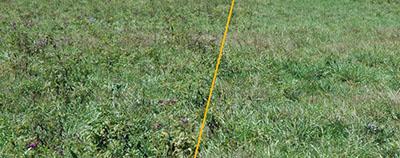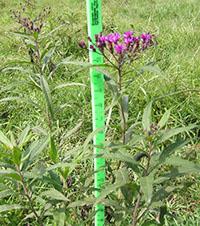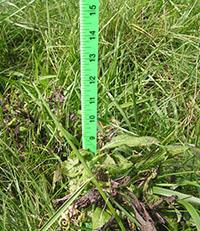Controlling Tall Ironweed and Horsenettle: Mike Setters
 This past year the Master Grazer Educational program conducted several demonstrations across KY for producers to see best management practices related to pasture management. One of these demonstrations was implemented in Lewis County by cow/calf producer Mike Setters. Previously, he has completed the Master Grazer and Master Cattleman programs and uses many of the practices taught in these programs, such as rotational grazing and improved access to water.
This past year the Master Grazer Educational program conducted several demonstrations across KY for producers to see best management practices related to pasture management. One of these demonstrations was implemented in Lewis County by cow/calf producer Mike Setters. Previously, he has completed the Master Grazer and Master Cattleman programs and uses many of the practices taught in these programs, such as rotational grazing and improved access to water.
 Mike participated in a demonstration trial concentrated on controlling weeds in pasture fields. Phillip Konopka, Lewis County agent, and Dr. J. Green worked with Mr. Setters to determine the field and the specific weeds that needed to be controlled the most. They decided to implement practices to control tall ironweed and horsenettle. Three weeks prior to the herbicide treatment, Mr. Setters clipped the pastures he intended to use for the demonstration. This allowed the weeds to have young, herbicide-susceptible regrow at time of herbicide application.
Mike participated in a demonstration trial concentrated on controlling weeds in pasture fields. Phillip Konopka, Lewis County agent, and Dr. J. Green worked with Mr. Setters to determine the field and the specific weeds that needed to be controlled the most. They decided to implement practices to control tall ironweed and horsenettle. Three weeks prior to the herbicide treatment, Mr. Setters clipped the pastures he intended to use for the demonstration. This allowed the weeds to have young, herbicide-susceptible regrow at time of herbicide application.
On July 29, 2014, Dr. Green used an UTV and sprayer to apply the herbicide treatment of ForeFront HL at a rate of 2 pints per acre. To allow the herbicide to work to control these weeds, they waited two months (September 26, 2014) before going back and taking forage samples from the field. In addition, Dr. Green left strips in the field untreated to allow comparisons to the treated area.
 When samples were collected in September, forage dry matter (DM) available in the treated area was 1946 lbs./ acre while the untreated area was only 1246 lbs. of DM/acre, a difference of 700 lbs. DM. The amount of weeds present in the non-treated area was 421 lbs. of DM/acre while only 9 lbs. of weed DM/ acre was present in the treated area. If the forage had been grazed in September, an additional 12 cow-grazing days per acre would have been available for grazing.
When samples were collected in September, forage dry matter (DM) available in the treated area was 1946 lbs./ acre while the untreated area was only 1246 lbs. of DM/acre, a difference of 700 lbs. DM. The amount of weeds present in the non-treated area was 421 lbs. of DM/acre while only 9 lbs. of weed DM/ acre was present in the treated area. If the forage had been grazed in September, an additional 12 cow-grazing days per acre would have been available for grazing.
Dr. Green said that the trial worked very well in showing how clipping and then applying herbicide can benefit pastures and reduce weed populations. Additional samples are going to be collected this upcoming year to determine the long-term effect of herbicide treatment on these pasture. After seeing the benefits from this study, Mr. Setters said that he is going to start using appropriate herbicides on the rest of his farm to control weeds.
For more information about controlling weeds in pastures, contact your local extension agent or check out the UK publication AGR-207: Broadleaf Weeds of Kentucky Pastures. Another good UK publication is AGR-172: Weed Management in Grass Pastures, Hayfields, and Other Farmstead Sites.
Categories:
Summer
Weed Control


